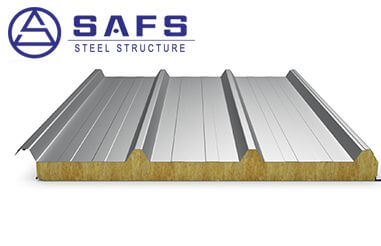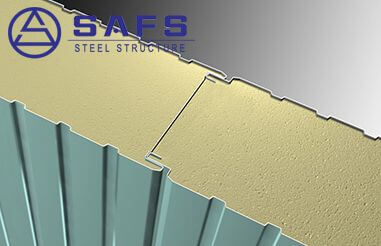Dapeng Town Industrial Park, Tongshan District, Xuzhou City, Jiangsu Province, China
Rock wool sandwich panel as a common building materials, environmental humidity has a non-negligible impact on it.

In terms of physical properties, humidity will first cause changes in the weight of the rock wool sandwich panel. Rock wool has a certain degree of water absorption, high humidity environment, it will absorb a lot of water, resulting in the overall weight of the sandwich panel rise. This not only challenges the load-bearing capacity of the building structure, but especially in roof or wall systems where rock wool sandwich panels are used over large areas, the extra weight can affect structural stability. Moreover, when exposed to moisture, rock wool sandwich panels are also prone to deformation and loss of original flatness, affecting installation accuracy and building appearance. At the same time, the expansion of rock wool caused by humidity can alter the dimensions of the sandwich panel, reducing its suitability in scenarios requiring high dimensional accuracy, such as the enclosure of precision manufacturing plants, where the creation of gaps can weaken its sealing.
For thermal insulation performance, the harm of humidity is more significant. When rock wool absorbs water, its thermal conductivity increases dramatically, as water is far more thermally conductive than dry rock wool. This makes the thermal insulation effect of sandwich panels greatly reduced, accelerating heat loss in winter and making it easier for outside heat to come in during summer, leading to increased building energy consumption and reduced indoor thermal comfort. In addition, when the ambient humidity is high and the temperature difference between the inside and outside of the sandwich panel is large, it is very easy for condensation to occur. Condensation of water droplets will be further wet rock wool, a vicious circle, so that the insulation performance continues to deteriorate, and humid environment is easy to breed mould and other microorganisms, both damage to the sandwich panel itself, but also may pollute the indoor air, endangering human health.

In terms of fire performance, short-term changes in humidity on the rock wool sandwich panel fire core performance impact is limited, after all, rock wool itself is an excellent non-combustible material, the root of its fire lies in its own chemical composition and fibre structure. However, if the long term in a high humidity environment, moisture penetration, may gradually change the physical structure of the rock wool, so that when the fire occurs on the flame spread of the blocking ability to be reduced. At the same time, the metal panel in the high humidity environment is easy to rust, long-term corrosion will reduce its strength and integrity, in the case of fire can not effectively play a role in protecting the rock wool core material, to prevent the spread of flames and smoke, thus affecting the entire rock wool sandwich panels of the fire performance and safety performance.